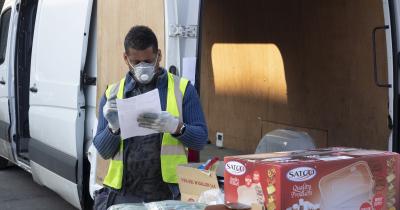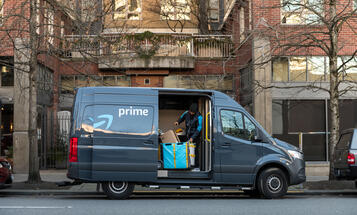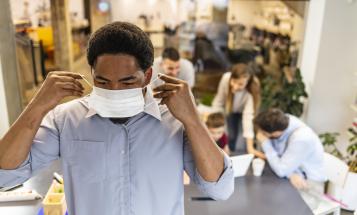
Protect Black and Brown Workers on the Front Lines of the Coronavirus Fight
A unique set of injustices confront workers still heading off to a job every day in the midst of a pandemic.

STAY HOME. This simple public health mandate is at the heart of the global effort to limit the deadly spread of COVID-19. Yet the order comes with a big, qualifying asterisk: Stay home*—unless you are a doctor, nurse, lab tech, medical assistant, or other hospital or clinic worker, including vital housekeeping staff. Stay home*—unless you work in a grocery store, laundromat, pharmacy, or restaurant that delivers food; drive a delivery truck; work at a warehouse; are a farmworker; work in manufacturing food, medical supplies, or sanitary items; are a caregiver for the elderly, disabled, or the children of essential workers; are a sanitation worker, a utility worker, or the driver (or cleaner!) of a bus or train that gets any of these essential workers to their essential jobs... The Department of Homeland Security’s list of essential jobs, many with functions that cannot be performed remotely, is 11 pages long and is not intended to be all-inclusive.
In a recent blog post, I discussed the implications of the nation’s soaring unemployment rate and the growing evidence that Black and brown workers are being hit hardest, with Latinx workers most likely to be thrown out of work, potentially devastating their financial stability in the short and long term. A different set of injustices confront workers still heading off to a job every day in the midst of a pandemic.
While Black people make up 11.9 percent of the U.S. labor force overall, they represent 17 percent of all frontline workers.
Analysts Hye Jin Rho, Hayley Brown, and Shawn Fremstad at the Center for Economic Policy Research find that Black workers are overrepresented in frontline industries: While Black people make up 11.9 percent of the U.S. labor force overall, they represent 17 percent of all frontline workers. For example, 17.5 percent of all health care workers are Black. Black women are particularly overrepresented among licensed practical and licensed vocational nurses—some of the workers providing the most direct, hands-on care to COVID-19 patients, often without the personal protective equipment they need to keep themselves safe from infection.
The reality that Black Americans are overrepresented among frontline workers is one reason for the horrific finding that—based on what is known from the locations that are reporting COVID-19 infection data by race—Black people are contracting the disease at especially high rates and dying from it. In some areas, Latinx and Native people also face exorbitant rates of disease and death.
Who gets worker protection in a time of pandemic is a critical question of racial justice.
Who gets worker protection in a time of pandemic is a critical question of racial justice.
Too many employers, including large corporations with ample resources and access to federally-funded bailouts, refuse to invest in the gear, supplies, and basic procedures necessary to protect the working people who keep America (and their businesses) functioning. Some grocery stores are prohibiting workers from wearing gloves. Meat processing plants are mandating workers continue to work shoulder-to-shoulder, setting off waves of infection. Delivery companies are leaving drivers with a single disinfecting wipe to sanitize a van. Farmworkers don’t have enough soap to wash their hands. Federal, state, and local governments, slow to protect public service workers from COVID-19, are often falling short as well.
The federal Occupational Health and Safety Administration (OSHA), tasked with regulating workplace safety, is missing in action. Congressional efforts to mandate safety measures for health care employees and other essential workers were blocked by Senate Republicans. The CDC’s latest guidance actually weakens worker protections, permitting employers to require workers who have been exposed to COVID-19 to remain on the job.
That’s why working people—from Amazon warehouse workers, to McDonald’s employees, to people who pick up and deliver grocery orders for Instacart, to nurses struggling with unsafe staffing levels—are walking off the job to pressure employers to protect their lives.
"We are out here as public workers trying to do our job, trying to make an honest living, trying to take care of our families,” Detroit bus driver Jason Hargrove said in a video posted on social media. Hargrove, a father of 6, died of complications from COVID-19 after raising the alarm about a passenger coughing on his bus. It was not until bus drivers across the city refused to work that Detroit’s municipal government finally agreed to take basic steps to protect them, making sure drivers had gloves, masks and disinfecting wipes.
No working person should have to risk their lives, or their jobs, to get the protection they require.
Employers must not be permitted to treat Black and brown workers as disposable. No working person should have to risk their lives, or their jobs, to get the protection they require. The next coronavirus relief law enacted by Congress must include the provisions of the Essential Workers Bill of Rights, requiring that employers provide personal protective equipment at no cost to workers and take appropriate protective actions when someone at the job site may have contracted coronavirus. The bill of rights calls for “hazard pay” for essential workers, as well as childcare, health care, and paid sick leave and family medical leave for every essential worker, regardless of immigration status or size of employer.
State and local governments—and public entities like the U.S. postal service—need additional federal funding to continue to provide essential services and better protect the public workers on the front lines.
By revealing how much every one of us depends on the work of often low-paid frontline workers of color, the coronavirus crisis demonstrates why working people need fair pay, paid leave, health care, and a voice on the job every day of the year, whether we are facing a pandemic or not.




